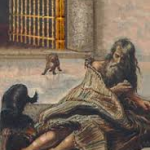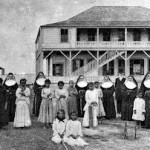Twenty-Sixth Sunday in Ordinary Time – Cycle C
Reflecting on Luke 16: 19-31
We’re twenty-six weeks into Ordinary Time, and already I’m thinking about snow. With the cool weather comes all the delicious smells and tastes and sights and sounds of fall. It’s finally time for pumpkin bread and football games. And that means that this liturgical year is beginning to wind down.
But before we start looking for the Advent candles, let’s reflect for a moment on the gospel―St. Luke’s gorgeous proclamation of good news for the poor ―that we’ve been hearing all year and will continue to hear for the next eight weeks. Today’s story about the rich man (Dives) and the poor beggar Lazarus is a perfect example of Luke’s “business plan”. His mission is that anyone who reads his gospel shall never again store up treasure for themselves while forgetting about those who have less. He wants us all to be rich in what matters to God. Eternity depends on it.
We’ve heard the great Lukan stories since last December. The poor, unmarried virgin says be it done unto me according to your will, and the world is changed forever. Early in his public ministry Jesus’ very first words to a great crowd assembled on a plain are blessed are you who are poor, for the kingdom of God is yours.
The guy who builds bigger barns to store all his goods has his life demanded of him that very night. The guest list for your big party should begin down at the homeless shelter and the school for the blind. And Jesus, for whom there is no room at the inn for his birth, in death is buried in a tomb not his own.
Okay, Luke. We’re listening.
Is there a Lazarus in your life?





